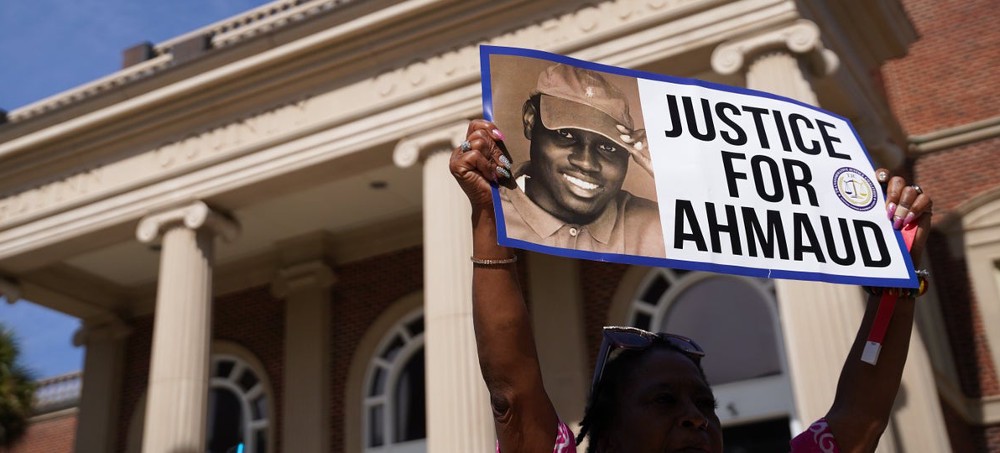Live on the homepage now!
Reader Supported News
For 30 years, I have walked and prayed with people in hospitals and courthouses, on picket lines and in jail cells. I pastor a congregation in eastern North Carolina, but I am also ordained as a bishop to minister among those who hunger and thirst for justice in this world. I joined the Arbery family in Brunswick, prayed with Ahmaud’s niece and nephews at the courthouse, and joined a multiracial march for justice because this is the work God has called me to do.
But after my visit to the courthouse last week, defense attorney Kevin Gough asked Superior Court Judge Timothy Walmsley to bar any more “Black pastors” from attending the trial.
In an argument the judge said he found “reprehensible,” Gough asserted that the presence in the courtroom of Black pastors such as the Rev. Al Sharpton could be “intimidating” to jurors. Sharpton had been in court with the Arbery family the day before I was there. Gough subsequently apologized “to anyone who might have inadvertently been offended” by his comments. But when the Rev. Jesse Jackson attended the trial on Monday, Gough reiterated his objection, emphasizing again his concern about “Black pastors.” “Which pastor is next?” he asked.
The Christian Church (Disciples of Christ) did not ordain me to be a Black pastor. I am a pastor, called to serve all of God’s children without regard to race, creed or culture. When Gough argued that the presence of Black pastors is intimidating, his words suggested that Blackness itself is a threat. This is telling because, to me, it seems that the three men on trial found Arbery’s Blackness intimidating as well.
Though Arbery was an unarmed jogger, these men say they assumed he was engaged in criminal activity and pursued him with weapons. One of the men recorded the group pursuing Arbery and one of them fatally shooting the young Black man.
I don’t think Gough’s objection is about me or any of the other clergy who have been at this trial; rather, it cuts to the heart of a dangerous mind-set in our society. However much we may want to believe that racism is the ignorance of a bygone era, perpetuated only by the few who say the “n-word" or maintain hatred toward others, white supremacy has always been an unjust order that people either consider it their duty to defend or dismantle.
Abolitionists who insisted on the full humanity of Black people were seen as intimidating and disruptive to the social order. White or Black, they were often portrayed as dangerous radicals, while those who accepted slavery were seen as reasonable defenders of the social order.
Though slavery is in our past, the racial order it created is not.
Black Lives Matter has pointed to continued racial disparity in policing, but the inequities we have inherited are everywhere in our society. Racism means Black people in the United States are twice as likely as their White neighbors to die of covid-19. It translates into persistent racial disparities in income, wealth, health outcomes, education and exposure to environmental hazards. When those who challenge these inequities are called dangerous or “intimidating,” to use Gough’s word, the old lies of racism are repeated.
Sadly, religion has often been distorted to perpetuate these lies. When Black and White people worked after the Civil War to build a more equitable society for all, some White preachers railed against the immorality of “Northern corruption” and “Negro rule.”
A century later, when the civil and women’s rights movements pushed the United States toward a second Reconstruction, reactionary political forces appealed to “traditional family values,” telling White Christians it was their moral duty to resist efforts to enforce equal protection under the law. As both James Baldwin and Bob Dylan observed, the preacher defended the Jim Crow system as much as the sheriff.
Perhaps Gough would be happy to have such preachers in the courtroom in Brunswick, Ga. But the Jesus I serve was clear that nations will be judged by how we treat those who are marginalized in our midst. “When you did it to the least of these,” Jesus said, “you did it unto me.” My pastoral ministry led me to Brunswick.
When we demand justice for Ahmaud Arbery, we stand with all who challenge inequities rooted in racism and insist on affirming the image of God in all people. If this is intimidating, it is only because we have accepted for far too long a status quo in which Blackness itself can be considered a threat.
Follow us on facebook and twitter!
PO Box 2043 / Citrus Heights, CA 95611


